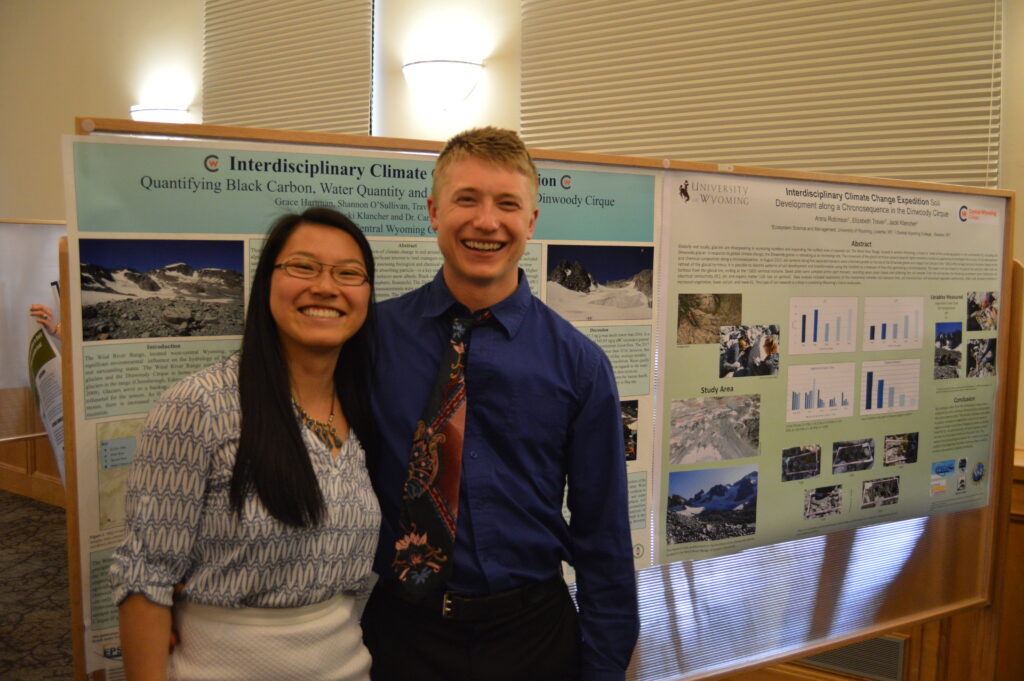Home / News / Past News / Spring 2018 / CWC UNDERGRADUATE RESEARCHERS RECEIVE HONORS FOR LINKING SCIENCE TO LIBERAL ARTS
CWC UNDERGRADUATE RESEARCHERS RECEIVE HONORS FOR LINKING SCIENCE TO LIBERAL ARTS
Home / News / Past News / Spring 2018 / CWC UNDERGRADUATE RESEARCHERS RECEIVE HONORS FOR LINKING SCIENCE TO LIBERAL ARTS
CWC UNDERGRADUATE RESEARCHERS RECEIVE HONORS FOR LINKING SCIENCE TO LIBERAL ARTS

Central Wyoming College alumni, Grace Hartman and Marten Baur, were honored at the University of Wyoming’s Undergraduate Research Day this past week for their performance on research through CWC’s Interdisciplinary Climate Change Expedition (ICCE) in August 2017. They were awarded of $1,000 for their efforts. The award was granted through Phi Beta Kappa in recognition of efforts that explore the connections between science and the human condition.
Hartman and Baur were part of a larger group of almost 400 students who presented their research at the conference. The students’ paper, “Black Carbon, Water Quantity and Water Quality in the Dinwoody Cirque” addressed the implications of glacial ice loss on local and regional hydrology and discussed the role that glaciers play in larger hydrologic systems.
“The water that is provided from alpine glaciers feeds not only the immediate area, but the basin below,” Hartman said. “This includes Fremont County, the Wind River Indian Reservation, and ultimately the Missouri Water Resource Region.”
Undergraduate research is becoming a more frequently utilized means of educating our students. Other CWC faculty such as Steve McAllister and Suki Smaglik paved the way for me, and now it is an integral component of how I teach and guide students. ”
Jacki Klancher, faculty mentor
Klancher, in conjunction with Darran Wells and Todd Guenther has been leading students on ICCE for the past four years.
“Like performing lab work, or taking field trips, leading students through research projects is another incredible tool we have to expand our students’ education, while also contributing meaningful data to the scientific community,” Klancher said.
Klancher said that this year’s field data was the tightest and most carefully collected to date, and that the student posters and presentations were exemplary.
“Grace and Marten did a superb job of not only collecting their data, but analyzing it, and discussing the implications,” Klancher said. They were accompanied by students Anna Robinson and Aaron Strubhar who also presented.
“All members of our student team worked very hard to pull together their work and to present it at the University of Wyoming,” Klancher said. “Creating a meaningful and contemporary picture of the changes that are occurring in the immediate high alpine is critical to understanding other changes that will impact the surrounding environs.”
The work of these students is of interest to wide range of stakeholders. Last fall CWC’s Ivan Posey and Tarissa Spoonhunter organized a well-attended event that brought together members from the Tribal Water Engineer together with CWC ICCE faculty.
“Given this data has implications for so many, we hope to be able to continue to share what our work with both the broader community,” Klancher said.
Throughout these next few years the ICCE team will continue to collect hydrologic and ecological data, but will also launch a new arm of our research into high elevation microbial communities.
“As we learn more about the role of microbes within our environment, we hope our students can help to broaden our understanding of microbial ecology in extreme environments as well,” Klancher said.
This work, like other CWC glacial and hydrology research to date will be funded by EPSCoR, a program overseen by the National Science Foundation; INBRE, overseen by the National Institute of Health; and the NASA WY Space Grant Consortium.
“Funding from these organizations has changed the educational trajectories of our students, and helped us to establish research as a key platform for how we educate our students,” Klancher said. “We are indebted to the University of Wyoming for including us in their loop of funding, and overall support.”
2660 Peck Avenue
Riverton, WY 82501
(307) 855 – 2000
Campus Map
120 Enterprise Blvd.
Lander, WY 82520
(307) 332 – 3394
Campus Map
240 S. Glenwood St #124
P.O. Box 4795
Jackson, WY 83001
(307) 733 – 7425
Campus Map
302 W. Ramshorn
P.O. Box 175
Dubois, WY 82513
(307) 455 – 2625
Campus Map
© 2024 Central Wyoming College – All Rights Reserved